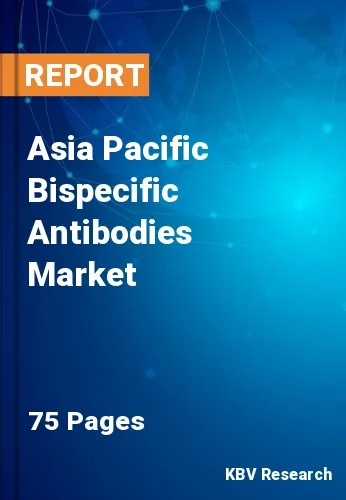The Asia Pacific Bispecific Antibodies Market would witness market growth of 42.8% CAGR during the forecast period (2023-2030).
Complex and varied mechanisms underlying inflammatory and autoimmune illnesses include cytokine imbalances, dysregulated immune responses, and aberrant cell signaling pathways. Traditional treatments frequently concentrate on a single molecular route or target, which reduces their effectiveness. Multiple targets can be engaged by bispecific antibodies like tibulizumab, ozoralizumab, and others. These give a more thorough approach to modifying these intricate disease systems, which may result in better outcomes.
Additionally, as more bispecific antibodies receive regulatory approval, businesses are more interested and confident in investing in R&D. The FDA, for instance, approved Teclistamab-cqyv (Tecvayli, Janssen Biotech, Inc.), which is the first BsAb B-cell maturation antigen, in October 2022 for adult patients with relapsed or refractory multiple myeloma. In order to take advantage of complementary skills and technology to generate bispecific antibodies, businesses are also actively collaborating and forming partnerships. Through these partnerships, research & development activities are increased, further accelerating market expansion.
The latest developments in applied science are being utilized by Chinese pharmaceutical businesses as they develop their unique technologies. Additionally, by combining a non-competing pair of human neutralizing antibodies, namely H4 and B38, to target two antigens, the researchers from Capital Medical University and the Chinese Academy of Sciences created the bispecific human mAbs against SARS-CoV-2. This prevented the virus from attaching to its receptor. The study, just published in Nature Immunology, found that the double-kill antibody, or bsAb15, has a higher neutralizing effectiveness than its parental antibodies and more neutralizing efficacy against the Delta variation. Such developments have successfully aided in the development of the regional market.
The China market dominated the Asia Pacific Bispecific Antibodies Market by Country in 2022, and would continue to be a dominant market till 2030; thereby, achieving a market value of $2,437 million by 2030. The Japan market is exhibiting a CAGR of 41.9% during (2023 - 2030). Additionally, The India market would showcase a CAGR of 43.7% during (2023 - 2030).
Based on Indication, the market is segmented into Cancer, Inflammatory & Autoimmune Disorder and Others. Based on countries, the market is segmented into China, Japan, India, South Korea, Singapore, Malaysia, and Rest of Asia Pacific.
Free Valuable Insights: The Worldwide Bispecific Antibodies Market is Projected to reach USD 80.2 Billion by 2030, at a CAGR of 40.9%
The market research report covers the analysis of key stake holders of the market. Key companies profiled in the report include Amgen, Inc., F. Hoffmann-La Roche Ltd., Pfizer, Inc., Akeso, Inc., Johnson & Johnson (Janssen Global Services, LLC), Taisho Pharmaceuticals Holding Co., Ltd., Immunocore Holdings plc, GlaxoSmithKline PLC (GSK), Novartis AG, and Allergan PLC (AbbVie, Inc.).
By Indication
By Country
Our team of dedicated experts can provide you with attractive expansion opportunities for your business.

